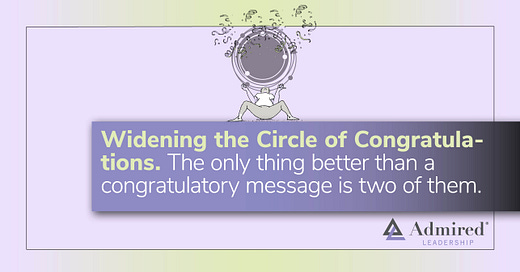Good leaders find the time to craft the appropriate message to acknowledge the great work and outcomes of those they value.
Congratulating others is perhaps the most symbolic action that signifies that a leader cares about others. Celebrating the success of others sends a clear message that a leader values people and stands for relationships.
Becoming a congratulatory leader requires a watchful eye. Learning about the people and events worthy of congratulations requires diligence. It’s a reminder to others that this information is important.
Once they learn that someone is entitled to congratulations, they don’t make excuses as to why they got too busy or didn’t make the effort to extend it. They pounce on good news and recognize people as soon as they can.
Those who cherish the role of making others feel special through congratulations also learn the power of widening the circle of acclaim. When leaders send a notice that a colleague or client is worthy of congratulations, they encourage others to weigh in with a high five, as well.
Including others in the congratulations serves to expand the celebration. You widen the affirming circle by CCing others on congratulatory emails, announcing the congratulations in public, and telling others about the good news you will soon be celebrating.
The next time you congratulate a colleague, friend, or client for achieving an important milestone, consider widening the circle of congratulations by including others in your message. Once leaders expand who knows about the good news, congratulations pick up speed.
The only thing better than a congratulatory message is two of them.





Love this! I have witnessed the contagion effect that this can have within an organization, community, or family, etc., when a leader practices this on a consistent basis. Being acknowledged is such a deep and primary desire. And being the acknowledger becomes somewhat effortless (and fulfilling) when we train ourselves to scan the landscape for the opportunities. Thanks for bringing this forward!
Do the most admired leaders you've studied try to do this in secret? Or does it matter to them that it becomes public that they are widening the circle?